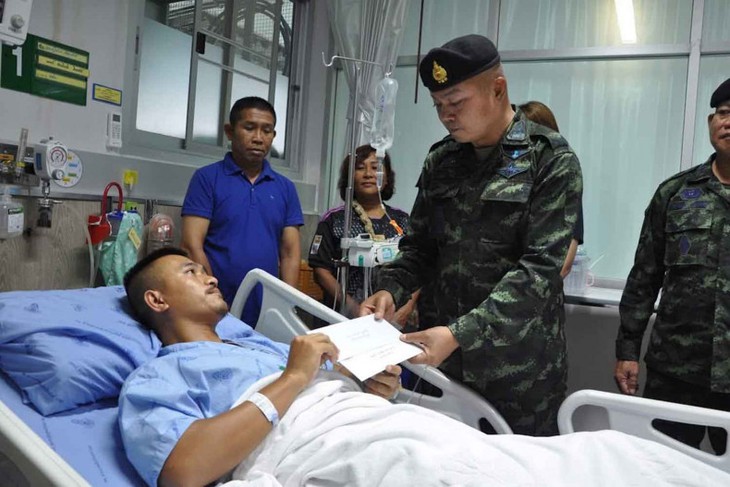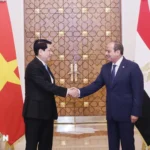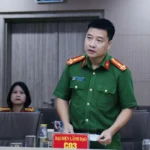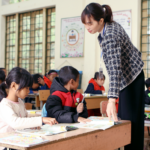Thai military claims newly planted landmines exploded at the border and vows retaliatory measures, while Cambodia denies involvement.
Tensions have risen between Thailand and Cambodia following a landmine explosion in the border area of Ubon Ratchathani province this week.
On July 20, the Thai Army Commander, General Pana Klaewplodthuk, stated that Bangkok is pursuing retaliatory measures against Cambodia after an investigation confirmed that the landmine responsible for the recent explosion was newly planted.
The explosion occurred on July 16 when a Thai patrol unit stepped on a mine in the Chok Bok area of Ubon Ratchathani, injuring three soldiers.
Thailand’s 2nd Army Region confirmed that Cambodian forces had planted new mines—possibly over 100—within their territory. Lieutenant General Boonsin Padklang, commander of the 2nd Army Region, stated that formal actions are being taken.
The military will recommend that the government instruct the Foreign Ministry to file a complaint with the United Nations under the 1997 Ottawa Convention, accusing Cambodia of violating the landmine ban.
Boonsin reported that eight mines were found in two clusters: three placed together, concealed under leaves and spaced 40cm apart, and another five positioned 90cm apart. All were newly manufactured, and the area showed no vegetation growth.
The mines were located 100–150 meters from Thai territory. Thailand has since initiated mine clearance operations and warned that hundreds more may remain in other areas.
Cambodia’s Mine Action Authority previously dismissed Thailand’s allegations as “baseless.”
“The Authority completely rejects the claims accusing Cambodia of planting new mines. Cambodia, heavily affected by wartime landmines and unexploded ordnance, strongly condemns their use, production, and stockpiling. We regret all tragedies caused by such explosives, regardless of location,” the agency stated.
However, Boonsin dismissed Cambodia’s counterclaim that Thai forces planted the mines.
“No one would place mines near their own troops… The explosives were clearly planted during our temporary patrol withdrawal. We reserve the right to respond decisively within our sovereign territory,” he asserted, holding Cambodia responsible.
While the government prepares a diplomatic complaint, Boonsin stated that the 2nd Army Region may take military action without awaiting orders.
Cambodian Prime Minister Hun Manet urged Thailand to reopen all border crossings and commit to avoiding future unilateral closures to ensure smooth trade flow.
Ubon Ratchathani province
Ubon Ratchathani, a province in northeastern Thailand (Isan), is known for its rich history, Buddhist heritage, and natural beauty. Founded in the late 18th century during the reign of King Taksin, it played a key role in regional trade and culture. Today, it is famous for the **Candle Festival** (Khao Phansa), historic temples like **Wat Thung Si Muang**, and the scenic **Mekong River**.
Chok Bok
“Chok Bok” (also spelled “Chok Bok” or “Chhuk Bok”) is a historical and cultural site in Cambodia, known for its ancient temple ruins and connection to the Khmer Empire. Located near the city of Kampong Cham, it features remnants of a hilltop temple believed to date back to the 7th–9th centuries, blending pre-Angkorian and Angkorian architectural styles. The site holds religious significance and offers scenic views of the surrounding Mekong River plains.
2nd Army Region
The **2nd Army Region** is a military command of the Royal Thai Army, historically responsible for overseeing defense operations in northeastern Thailand. Established to maintain security and support national defense strategies, it has played a key role in regional stability, particularly during periods of internal and external conflicts. Today, it continues to manage military affairs, disaster response, and community support in its designated area.
United Nations
The **United Nations (UN)** is an international organization founded in 1945 after World War II to promote peace, security, and cooperation among nations. Comprising 193 member states, it addresses global issues such as human rights, climate change, and humanitarian aid through agencies like the General Assembly and Security Council. Its headquarters in New York City symbolizes diplomacy and multilateral efforts to resolve conflicts and improve living standards worldwide.
Ottawa Convention
The **Ottawa Convention**, formally known as the **Mine Ban Treaty**, is an international agreement adopted in 1997 in Ottawa, Canada, to prohibit the use, stockpiling, and transfer of anti-personnel landmines. It was a response to the severe humanitarian crisis caused by landmines, particularly in post-conflict regions. Since its entry into force in 1999, over 160 countries have joined the treaty, significantly reducing landmine casualties and promoting global disarmament efforts.
Cambodia’s Mine Action Authority
The Cambodia Mine Action Authority (CMAA) is a government agency established in 2000 to coordinate and oversee landmine and explosive ordnance clearance efforts in Cambodia. Stemming from decades of conflict, including the Khmer Rouge regime and civil wars, Cambodia remains one of the most heavily mined countries in the world. The CMAA works with national and international partners to reduce casualties, support victims, and clear hazardous areas for development.
Hun Manet
Hun Manet is not a place or cultural site but rather the name of the current Prime Minister of Cambodia. He is the eldest son of former Prime Minister Hun Sen and took office in August 2023 after his father’s long rule. His leadership marks a significant political transition in Cambodia’s modern history.
Foreign Ministry
The **Foreign Ministry** (or Ministry of Foreign Affairs) is a government department responsible for managing a country’s diplomatic relations, international treaties, and foreign policy. Historically, such institutions emerged in Europe during the 17th–18th centuries, with France’s *Ministère des Affaires Étrangères* (founded in 1626) among the earliest. Today, foreign ministries operate globally, facilitating diplomacy, consular services, and international cooperation.






